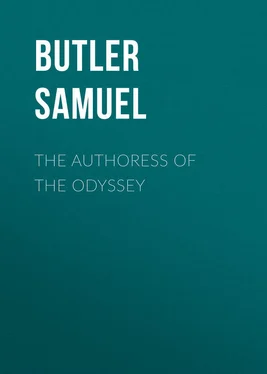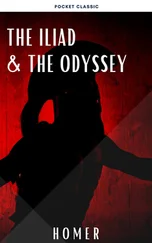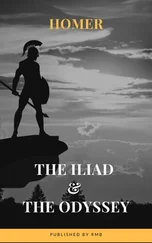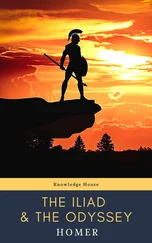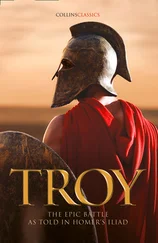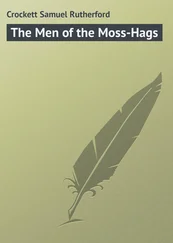Samuel Butler - The Authoress of the Odyssey
Здесь есть возможность читать онлайн «Samuel Butler - The Authoress of the Odyssey» — ознакомительный отрывок электронной книги совершенно бесплатно, а после прочтения отрывка купить полную версию. В некоторых случаях можно слушать аудио, скачать через торрент в формате fb2 и присутствует краткое содержание. Жанр: foreign_antique, foreign_prose, на английском языке. Описание произведения, (предисловие) а так же отзывы посетителей доступны на портале библиотеки ЛибКат.
- Название:The Authoress of the Odyssey
- Автор:
- Жанр:
- Год:неизвестен
- ISBN:нет данных
- Рейтинг книги:5 / 5. Голосов: 1
-
Избранное:Добавить в избранное
- Отзывы:
-
Ваша оценка:
- 100
- 1
- 2
- 3
- 4
- 5
The Authoress of the Odyssey: краткое содержание, описание и аннотация
Предлагаем к чтению аннотацию, описание, краткое содержание или предисловие (зависит от того, что написал сам автор книги «The Authoress of the Odyssey»). Если вы не нашли необходимую информацию о книге — напишите в комментариях, мы постараемся отыскать её.
The Authoress of the Odyssey — читать онлайн ознакомительный отрывок
Ниже представлен текст книги, разбитый по страницам. Система сохранения места последней прочитанной страницы, позволяет с удобством читать онлайн бесплатно книгу «The Authoress of the Odyssey», без необходимости каждый раз заново искать на чём Вы остановились. Поставьте закладку, и сможете в любой момент перейти на страницу, на которой закончили чтение.
Интервал:
Закладка:
The translation of the "Iliad" became a necessity when once that of the "Odyssey" had been undertaken, and the book about the Sonnets was also a consequence of the "Odyssey," for his interest in the problem of the Sonnets, the work of the greatest poet of modern times, was aroused by his interest in the problem of the "Odyssey," one of the two great poems of antiquity. Besides all this he was engaged upon the words and music of Ulysses , in making journeys to Sicily to pick up more facts about the topography of Scheria, and in making a journey to Greece and the Troad to investigate the geography of the "Iliad." Thus it may be said that the last ten years of his life were overshadowed by the "Odyssey," which dominated his thoughts-and not only his thoughts, his letters were full of it and it was difficult to get him to talk of anything else. I have little doubt that this perpetual preoccupation-I may even say obsession-tended to shorten his life.
None of the eminent classical scholars paid any attention to Butler's views on the "Odyssey," or if any did they did not say so in public, and he resented their neglect. He was not looking for praise; as Sir William Phipson Beale, one of his oldest friends, said to me very acutely: "People misunderstood Butler; he did not want praise, he wanted sympathy." It is true as he records in The Authoress ( p. 269 Конец ознакомительного фрагмента. Текст предоставлен ООО «ЛитРес». Прочитайте эту книгу целиком, купив полную легальную версию на ЛитРес. Безопасно оплатить книгу можно банковской картой Visa, MasterCard, Maestro, со счета мобильного телефона, с платежного терминала, в салоне МТС или Связной, через PayPal, WebMoney, Яндекс.Деньги, QIWI Кошелек, бонусными картами или другим удобным Вам способом.
), that "one of our most accomplished living scholars" – I do not know who he was, though I no doubt heard at the time-chided him and accused him of being ruthless. "I confess," said the scholar, "I do not give much heed to the details on which you lay so much stress; I read the poem not to theorise about it but to revel in its amazing beauty." This can hardly be called sympathy. Butler comments upon it thus:
"It would shock me to think that I have done anything to impair the sense of that beauty which I trust I share in even measure with himself; but surely if the 'Odyssey' has charmed us as a man's work, its charm and its wonder are infinitely increased when we see it as a woman's."
Still there were some competent judges who approved. The late Lord Grimthorpe interested himself in the problem, accepted Butler's views, and gave him valuable suggestions about the description in the poem of the hanging of those maidservants in Ithaca who had disgraced themselves. Mr. Justice Wills also expressed agreement, but he did it in a letter to me after Butler's death. These names are mentioned in the Memoir, and there is another name which ought to have appeared there, but I overlooked the note at the right moment.
Butler delivered at the Fabian Society a lecture entitled, "Was the 'Odyssey' written by a Woman?" At the close of the lecture Mr. Bernard Shaw got up and said that when he had first heard of the title he supposed it was some fad or fancy of Butler's, but that on turning to the "Odyssey" to see what could have induced him to take it up he had not read a hundred lines before he found himself saying: "Why, of course it was!" And he spoke so strongly that people who had only laughed all though the lecture began to think there might be something in it after all.
These, however, were not the eminent Homeric scholars to whom Butler looked for sympathy. He was disappointed by the silence of the orthodox, and it was here that Charles Lamb got in his revenge, for the situation never would have arisen if it had not been for that fatal reading of "Charles Lamb's translation of parts of the 'Odyssey' in Ainger's book."
When Keats first looked into Chapman's Homer the result was the famous sonnet. When Lamb did the same thing the result was "a juvenile book, The Adventures of Ulysses." He wrote to Manning, 26th February, 1808:
"It is done out of the 'Odyssey,' not from the Greek (I would not mislead you), nor yet from Pope's 'Odyssey,' but from an older translation of one Chapman. The Shakespeare Tales suggested the doing of it."
I suppose that by "Ainger's book" Butler means Charles Lamb in the "English Men of Letters Series," edited by John Morley and published by Macmillan in 1878; at least I do not find any other book by Ainger about Lamb which contains any mention of The Adventures of Ulysses between that date and the date of Butler's letter to his sister in 1886. If I remember right Butler saw "Ainger's book" at Shrewsbury when he was staying with his sisters, and I like to think that it was a copy given to them by the author. But I doubt whether he can have done more than look into it; if he had read it with attention he would scarcely have spoken of Lamb's work as translation. I imagine that he listlessly took the book up off the drawing-room table, and, happening to open it at page 68, saw that Lamb had written The Adventures of Ulysses ; this would be enough to suggest the story of the "Odyssey" to him, and he must have missed or forgotten Ainger's statement that Lamb said to Bernard Barton: "Chapman is divine and my abridgement has not quite emptied him of his divinity." What concerns us now, however, is to note the result on Butler, which was that he embarked upon all this apparently fruitless labour. It is interesting to note also that as Lamb, by writing the Tales from Shakespeare , had been led to the "Odyssey," so Butler, by choosing Ulysses as the hero of our oratorio, was led, in a contrary direction, to the Sonnets.
We must now come nearer to modern times. The Authoress of the Odyssey appeared in 1897, and Butler's Translation in 1900-that is about twenty years ago; during which period, sympathy or no sympathy, the books must have had a good many readers, perhaps among the general public rather than among classical scholars, for now, in 1921, the stock is exhausted and new editions of both are wanted. They have been reset entirely, misprints and obvious mistakes have been corrected, the index has been revised, and there are a few minor typographical changes; but nothing has been done which could be called editing, bringing up to date, adding supplementary matter, dissenting or recording dissent from any of the author's views. The size of the original page has been reduced so as to make the books uniform with Butler's other works; and, fortunately, it has generally been possible, by using a smaller type, to get the same number of words into each page, so that the pagination is scarcely altered and the references remain good. Except for the alterations about to be noted (in respect of The Authoress ), the books are faithful reprints of the original editions.
( a ) About three lines have been interpolated on page 207 which upsets the pagination until page 209. The interpolation, which is taken from a note by Butler in his copy of the work, is to the effect that the authoress, in Book vii, line 137, almost calls her countrymen scoundrels by saying that they made their final drink-offerings not to Jove but to Mercury, the god of thieves. On this passage there is a note in the Translation saying that the poet here intends hidden malice; but, except for this interpolation, attention does not appear to be called to the malice anywhere else in The Authoress .
( b ) The note on page 214 is so printed that the pagination is upset for one page.
Читать дальшеИнтервал:
Закладка:
Похожие книги на «The Authoress of the Odyssey»
Представляем Вашему вниманию похожие книги на «The Authoress of the Odyssey» списком для выбора. Мы отобрали схожую по названию и смыслу литературу в надежде предоставить читателям больше вариантов отыскать новые, интересные, ещё непрочитанные произведения.
Обсуждение, отзывы о книге «The Authoress of the Odyssey» и просто собственные мнения читателей. Оставьте ваши комментарии, напишите, что Вы думаете о произведении, его смысле или главных героях. Укажите что конкретно понравилось, а что нет, и почему Вы так считаете.
